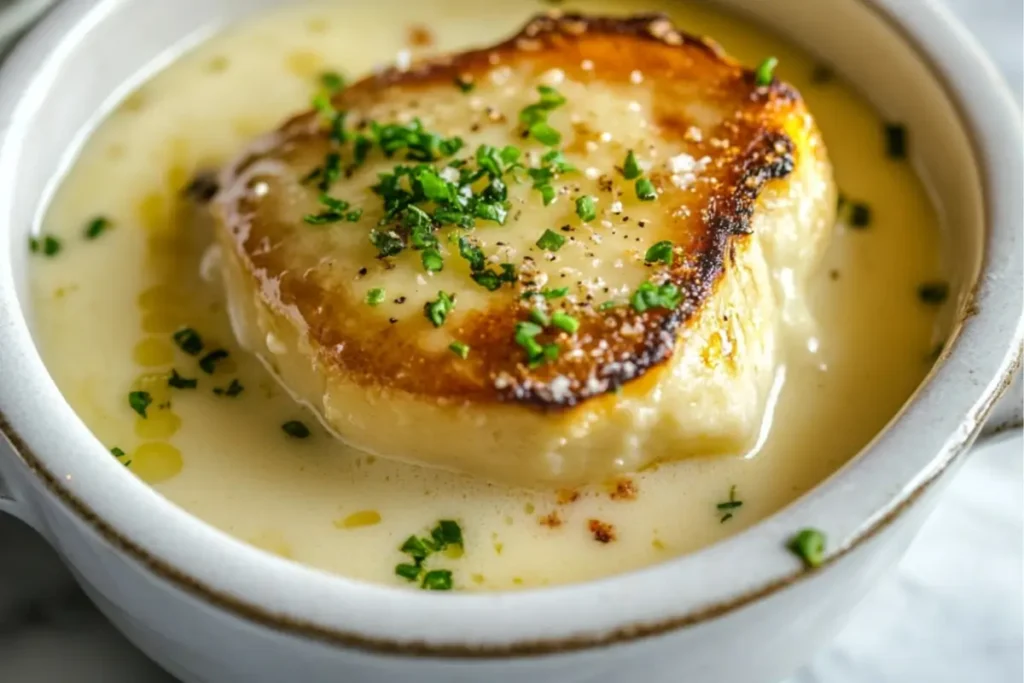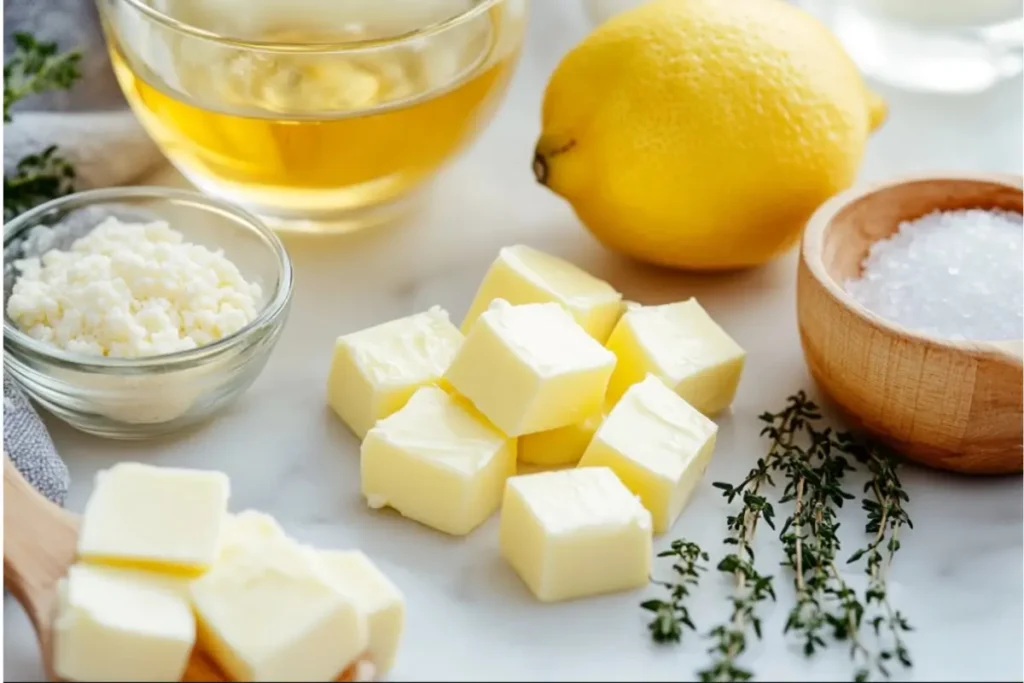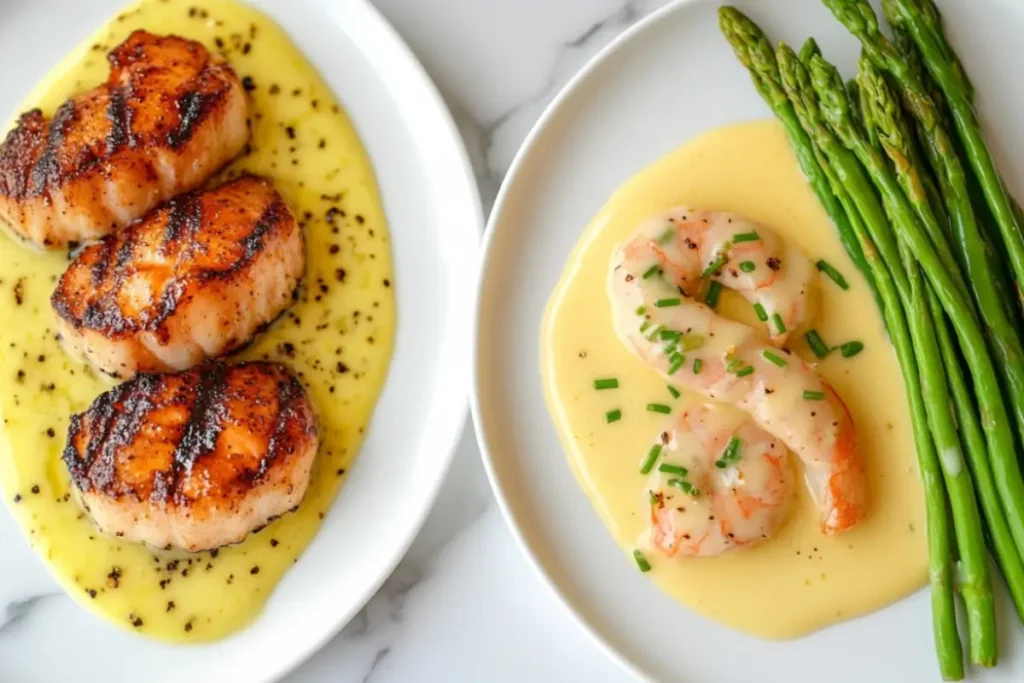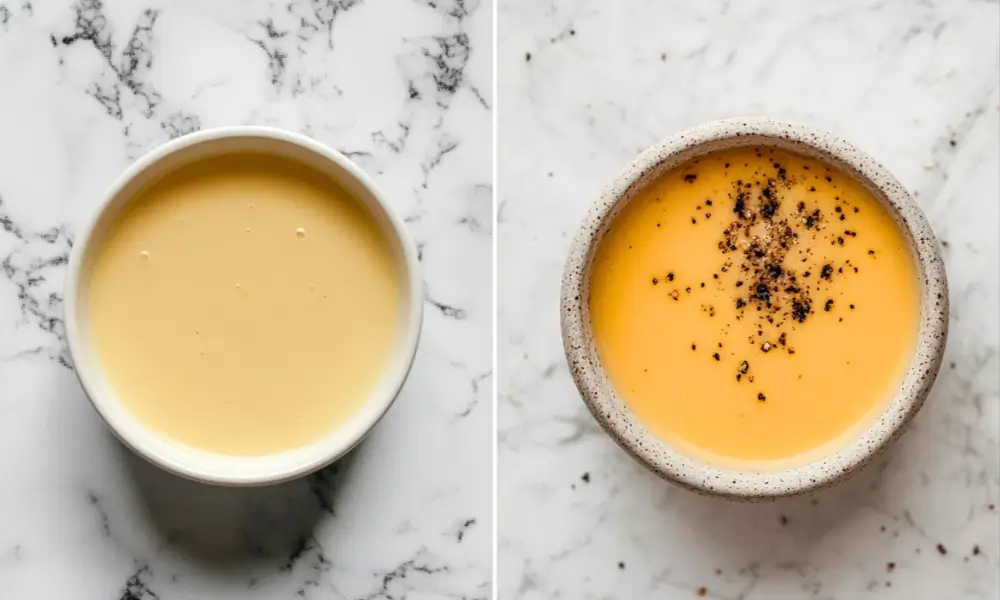Have you ever been at a fancy dinner or watching a cooking show and heard the words “beurre blanc” or “hollandaise sauce”? Maybe you wondered, “Aren’t they just sauces with butter?” While both of these French sauces are buttery and luxurious, they have their own unique personalities, much like two siblings with distinct quirks. Let’s break it down and explore what makes these sauces shine and when to use them!
Introduction to Beurre Blanc and Hollandaise Sauce
Beurre blanc and hollandaise sauce are staples in French cuisine, and their creamy textures make them favorites in the culinary world. But what sets them apart? Here’s the quick scoop: beurre blanc is a light, tangy sauce made by reducing wine and whisking in butter, while hollandaise is a rich, velvety emulsion made with egg yolks, butter, and lemon juice. Pretty cool, right?
While they may seem interchangeable to the untrained palate, they couldn’t be more different in flavor, texture, and technique. Let’s explore these delicious French classics in greater detail to see what makes them stand out on their own!
What Is Beurre Blanc?
Beurre blanc, which translates to “white butter,” is all about elegance. This sauce originates from the Loire Valley in France and is often paired with fish, shellfish, or steamed vegetables. It’s the kind of sauce that feels light yet indulgent, making it perfect for when you want to elevate a simple dish without overwhelming it. The beauty of beurre blanc lies in its simplicity—just wine, vinegar, shallots, and butter working together to create magic.
“Beurre blanc is like the quiet artist in the corner, creating masterpieces with just a few tools.”
What’s unique about beurre blanc is its texture. It’s not thick like a gravy or creamy like a dressing. Instead, it’s silky and almost airy, coating your food with just the right amount of buttery goodness. Think of it as the perfect finishing touch—like adding a fancy bow to a gift.
What Is Hollandaise Sauce?
Now, hollandaise is the extroverted sibling! Known as one of the five mother sauces in French cooking, it’s made by emulsifying egg yolks, melted butter, and a splash of lemon juice. Hollandaise screams decadence and is often draped over eggs Benedict, asparagus, or roasted potatoes. Think of it as the showstopper at brunch, demanding attention with its rich flavor and velvety texture.
Unlike beurre blanc, hollandaise is a little trickier to master. It requires careful whisking to ensure the butter and egg yolks combine without splitting. But when done right, it’s worth every bit of effort. It’s the sauce that makes you feel like a gourmet chef, even if all you’ve done is cook some eggs.
Origins and History of the Sauces

The French Culinary Roots of Beurre Blanc
The story of beurre blanc supposedly started with a happy accident. A French chef intended to make béarnaise sauce but forgot the egg yolks. Instead of tossing the attempt, they finished the sauce with butter, and voilà! Beurre blanc was born. It’s a classic underdog tale, proving that even mistakes can lead to something spectacular.
Today, beurre blanc remains a favorite in French cuisine, especially in regions known for their seafood. Its tangy yet mellow flavor complements delicate proteins like fish or scallops, making it a must-have for chefs and home cooks alike.
Hollandaise Sauce: A Classic Mother Sauce
Hollandaise sauce has deeper roots in French culinary tradition. It’s one of the five “mother sauces” classified by Auguste Escoffier, a legendary French chef. Its name might suggest Dutch origins (“Hollandaise” means “Dutch-style”), but the French perfected it. Fun fact: it was initially served over vegetables before becoming brunch royalty.
This sauce dates back to the 17th century and has since become synonymous with indulgent dining. It’s rich, smooth, and tangy—a true hallmark of French gastronomy. Once you taste it, you’ll understand why it’s been a staple for centuries.
Key Ingredients: Beurre Blanc vs. Hollandaise

What makes these sauces so different? It’s all about the ingredients. Both rely on butter, but the supporting cast changes the flavor game. Understanding the ingredients not only helps you distinguish between the two but also gives you insight into how they achieve their unique textures and tastes.
| Ingredient | Beurre Blanc | Hollandaise |
|---|---|---|
| Butter | Unsalted | Clarified |
| Acid | White wine vinegar | Lemon juice |
| Aromatics | Shallots | Optional |
| Egg Yolks | Not used | Essential |
Essential Ingredients for Beurre Blanc
Beurre blanc is incredibly straightforward. You’ll need:
- Unsalted butter (it’s the star, so go for quality!)
- White wine vinegar or dry white wine
- Shallots (these add depth and a touch of sweetness)
- A pinch of salt
The secret to a perfect beurre blanc is the balance between the tanginess of the wine and the richness of the butter. It’s not about overpowering flavors but creating harmony on the plate.
What Goes Into Hollandaise Sauce?
Hollandaise sauce has a slightly longer grocery list but is just as rewarding. Here’s what you’ll need:
- Egg yolks (for richness and thickness)
- Clarified butter (this gives it a silky texture)
- Lemon juice (to cut through the richness)
- Cayenne or white pepper (optional but adds a nice kick)
The trickiest part of hollandaise is the emulsion. Too much butter too quickly? The sauce splits. Not enough whisking? You’ll end up with scrambled eggs. But don’t worry—we’ll cover tips to nail it later.
Preparation Methods for Each Sauce
Let’s roll up our sleeves and get cooking. Making these sauces might sound intimidating, but with the right technique, you’ll nail it! Beurre blanc and hollandaise each require patience, attention, and a bit of love to come out just right.
Step-by-Step: How to Make Beurre Blanc
Here’s how to whip up a perfect beurre blanc:
- Prepare the reduction: In a saucepan, simmer white wine vinegar and chopped shallots until it reduces by half. This step builds the foundation of the sauce.
- Add butter: Over low heat, whisk in small cubes of cold butter, one at a time. Keep whisking until the sauce thickens and becomes silky.
- Season: Add a pinch of salt and taste to adjust flavors. Remember, a little seasoning goes a long way!
- Serve immediately: Beurre blanc doesn’t reheat well, so enjoy it fresh! Drizzle it over fish or vegetables for a restaurant-quality touch.
Step-by-Step: How to Make Hollandaise Sauce
Making hollandaise is like orchestrating a symphony. Here’s how:
- Set up a double boiler: Place a heatproof bowl over a pot of simmering water (but don’t let the water touch the bowl). This ensures gentle, even heat.
- Whisk the yolks: Combine egg yolks and a splash of water in the bowl. Whisk continuously until the mixture thickens slightly.
- Drizzle in butter: Slowly pour in melted clarified butter while whisking. This creates the emulsion, and patience is key!
- Add lemon juice: Stir in lemon juice and season with salt and cayenne. The acidity brightens the flavors beautifully.
- Serve warm: Keep hollandaise warm but not hot to prevent curdling. Serve it over eggs Benedict, and watch your guests swoon!
Stay tuned for part two, where we’ll dive into flavor profiles, common mistakes, and pro tips for mastering these sauces!
Differences in Flavor Profiles

When it comes to beurre blanc and hollandaise sauce, their flavors couldn’t be more distinct. Imagine a zesty lemonade versus a creamy milkshake—both are delicious but satisfy completely different cravings. Let’s dig into what makes each sauce unique in taste.
Beurre Blanc’s Delicate Butteriness
Beurre blanc is all about subtlety. The base of white wine vinegar or dry white wine gives it a tangy kick, but the copious amounts of butter mellow that out, leaving you with a silky, lightly tangy sauce. The addition of shallots adds a mild sweetness and a touch of complexity.
Picture this: You’re enjoying a perfectly cooked piece of salmon, and it’s topped with beurre blanc. The sauce doesn’t overpower the fish; instead, it complements the delicate flavors, making each bite more luxurious. That’s the magic of beurre blanc—it enhances without stealing the spotlight.
Hollandaise’s Rich and Tangy Notes
On the other hand, hollandaise sauce is bold and unapologetically rich. It combines the creaminess of clarified butter with the tang of lemon juice, creating a flavor that’s both indulgent and refreshing. Unlike beurre blanc, it has a thicker consistency that clings to your food, almost like a warm blanket of flavor.
Hollandaise is the sauce you want for hearty dishes. Think about it: a stack of fluffy eggs Benedict, with the hollandaise cascading down like a golden waterfall. It’s rich, zesty, and utterly irresistible.
Texture and Consistency: Comparing the Two Sauces
Another key difference between beurre blanc and hollandaise is their texture. This might seem like a small detail, but it makes a big difference in how they’re used in cooking.
Beurre Blanc: Silky and Light
Beurre blanc is almost like liquid gold. It has a thinner consistency that allows it to coat your food lightly. This makes it perfect for dishes where you want the sauce to accentuate the flavors rather than dominate them. Think of it as the elegant whisper in a conversation.
Because beurre blanc is emulsified with butter, it has a smooth and glossy texture. However, it’s not as heavy as you might expect. The acidity from the wine keeps it from feeling overly rich, making it an excellent choice for lighter dishes like seafood and vegetables.
Hollandaise: Thick and Velvety
Hollandaise, on the other hand, is thick, creamy, and luxurious. Its texture is closer to a custard than a sauce, thanks to the egg yolks. This makes it ideal for dishes where you want the sauce to take center stage.
One of the reasons hollandaise pairs so well with eggs Benedict is because of its consistency. It clings to the poached eggs and the English muffin, creating a cohesive dish where every bite is full of flavor. It’s not just a sauce; it’s a star performer.
Common Problems When Making These Sauces
Let’s be real: both beurre blanc and hollandaise have a reputation for being tricky to make. But don’t let that scare you! Understanding the most common issues and how to fix them can save you from sauce disasters. After all, even the best chefs have faced a split sauce or a curdled mess.
Beurre Blanc Splitting: Causes and Solutions
One of the biggest challenges with beurre blanc is keeping it emulsified. Since it’s made with butter, there’s always the risk of it separating into a greasy mess. But why does this happen?
- Cause: Adding the butter too quickly or using high heat can cause the emulsion to break.
- Solution: Always use cold butter and add it gradually, whisking constantly. Keeping the heat low is key to maintaining the sauce’s stability.
“Think of making beurre blanc like dancing a waltz—it’s all about rhythm and gentle movements.”
If your beurre blanc does split, don’t panic. You can often bring it back by whisking in a splash of cold water or wine while keeping it over low heat.
Hollandaise Sauce Curdling: How to Fix It
Hollandaise sauce has its own set of challenges, and curdling is the most common one. This happens when the heat is too high, causing the egg yolks to cook and form lumps. It’s a frustrating problem, but it’s totally fixable!
- Cause: Overheating or adding the butter too quickly can cause the eggs to scramble.
- Solution: Use a double boiler to keep the heat gentle and consistent. Add the butter in a slow, steady stream while whisking constantly.
If your hollandaise does curdle, you can save it by whisking in a tablespoon of cold water or lemon juice. It won’t be perfect, but it’ll still be delicious!
Tips for Perfecting Both Sauces
Now that we’ve covered the common pitfalls, let’s talk about how to achieve sauce perfection. Whether you’re making beurre blanc or hollandaise, these tips will help you create a masterpiece every time.
Expert Tips for a Perfect Beurre Blanc
- Use high-quality butter. Since butter is the star ingredient, it’s worth splurging on the good stuff.
- Keep the heat low. This prevents the sauce from breaking and ensures a smooth texture.
- Taste as you go. The balance of acidity and richness is crucial, so adjust the seasoning to your liking.
Foolproof Techniques for Hollandaise Success
- Prep your ingredients beforehand. Once you start whisking, there’s no time to measure out butter or lemon juice.
- Use a double boiler. This provides gentle, even heat, which is essential for emulsifying the eggs and butter.
- Don’t rush. Take your time adding the butter, and keep whisking to maintain the emulsion.
“Mastering hollandaise sauce is like learning to ride a bike—it’s tricky at first, but once you get the hang of it, it’s smooth sailing.”
Health Considerations: Which Sauce Is Better for You?
Let’s face it: both beurre blanc and hollandaise are indulgent. But if you’re watching your calorie or fat intake, you might be wondering which one is the healthier choice. Spoiler alert: neither is going to win any awards for being light. However, there are some differences to consider.
Nutritional Comparison of Beurre Blanc and Hollandaise
Here’s a quick breakdown:
| Nutrition | Beurre Blanc (per 2 tbsp) | Hollandaise (per 2 tbsp) |
|---|---|---|
| Calories | 150 | 200 |
| Fat | 16g | 22g |
| Carbohydrates | 0g | 0g |
| Protein | 0g | 2g |
As you can see, beurre blanc is slightly lighter than hollandaise, but the difference isn’t huge. If you’re looking for a healthier alternative, consider using less butter or opting for a yogurt-based hollandaise.
Are There Any Lighter Alternatives?
If you want the flavors of beurre blanc or hollandaise without all the calories, there are ways to lighten them up. For beurre blanc, you can reduce the amount of butter and replace it with a bit of stock. For hollandaise, try substituting some of the butter with Greek yogurt—it’s not traditional, but it’s still tasty!
FAQs About Beurre Blanc and Hollandaise Sauce
Can You Use Beurre Blanc Instead of Hollandaise?
Absolutely! While they’re not identical, beurre blanc can be a great substitute for hollandaise in some dishes, especially if you’re looking for a lighter option.
How Long Can Each Sauce Be Stored?
Neither sauce keeps well. Beurre blanc should be used immediately, while hollandaise can be stored for up to an hour over gentle heat. After that, they both start to lose their texture and flavor.
What’s the Easiest Sauce for Beginners to Try?
Beurre blanc is generally easier because it doesn’t require emulsifying egg yolks. If you’re new to sauce-making, start there!
Discover More French Sauces
Dive into our guide on Lemon Beurre Blanc for a zesty twist on this classic sauce, or explore Crème Brûlée Hacks to master silky textures. Perfect companions for your sauce adventures!
Final Thoughts
Whether you’re a beurre blanc fan or a hollandaise enthusiast, there’s no denying that these sauces are culinary masterpieces. With the tips and techniques in this article, you’re ready to impress your family, friends, or even just yourself. Happy cooking!


